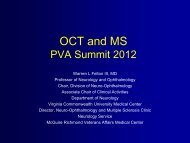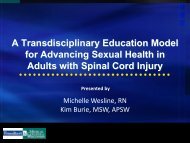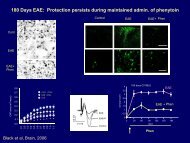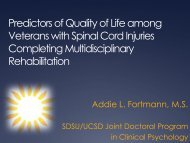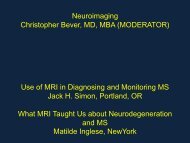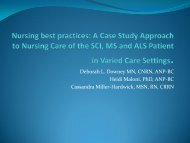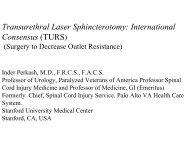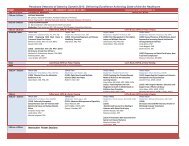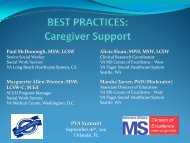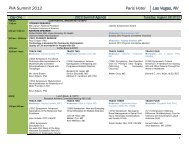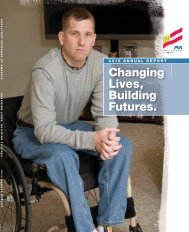Laura Leach, PhD
Laura Leach, PhD
Laura Leach, PhD
You also want an ePaper? Increase the reach of your titles
YUMPU automatically turns print PDFs into web optimized ePapers that Google loves.
ADDRESSING THE COGNITIVE CHALLENGES<br />
IN PATIENTS WITH MULTIPLE SCLEROSIS<br />
IN THE VA SYSTEM<br />
Pamela H. Miller, M.A., CCC-SLP<br />
<strong>Laura</strong> D. <strong>Leach</strong>, Ph.D.
LEARNING OBJECTIVES<br />
1) To describe the results of a VA systemwide<br />
survey on care for patients with<br />
Multiple Sclerosis and cognitive deficits.<br />
2) To summarize what we know about<br />
Multiple Sclerosis and cognition through<br />
the evaluation process.<br />
3) To discuss the variety of cognitive<br />
rehabilitation approaches available for<br />
those with Multiple Sclerosis.
DISCLOSURES<br />
• This continuing education activity is managed<br />
and accredited by Professional Education<br />
Service Group. The material presented in this<br />
activity represents the opinion of the faculty.<br />
Neither PESG, nor any accrediting organization<br />
endorses any commercial products displayed in<br />
conjunction with this activity.<br />
• Commercial Support was not received for this<br />
activity.
Disclosures Continued<br />
• Pamela H. Miller, M.A., CCC-SLP, has<br />
no financial interests to disclose.<br />
• <strong>Laura</strong> D. <strong>Leach</strong>, Ph.D. , has no financial<br />
interests to disclose.<br />
• Professional Education Services Group<br />
staff have no financial interests or<br />
relationships to disclose.
BACKGROUND:<br />
Multiple Sclerosis Centers of Excellence:<br />
(MSCoE)<br />
2001: Congress urged VHA to establish 2 MSCoE<br />
• Mandated establishment of National<br />
Standards for the care of veterans with MS:<br />
Clinical Care, Education and Research<br />
2002: Selected VA Medical Centers in:<br />
• Baltimore, MD (MSCoE: East)<br />
• Jointly-based in Portland & Seattle<br />
(MSCoE:West)<br />
2006: Veteran’s Benefits and Information<br />
Technology Act. Made the MSCoE permanent.
MISSION:<br />
Multiple Sclerosis Centers of Excellence<br />
(VHA Handbook 1011.06, Revised 2009)<br />
To Support and Maintain the:<br />
• Health<br />
• Independence<br />
• Quality of Life<br />
• Productivity of Veterans with MS<br />
through clinical care, education and<br />
research
MULTIPLE SCLEROSIS<br />
SYSTEMS OF CARE PROCEDURES<br />
(VHA Handbook 1011.06, Revised 2009)<br />
• Defines requirements for services that<br />
must be provided at VA Medical Facilities.<br />
• Sites are recommended to go beyond the<br />
specifications in accordance with their<br />
resources and opportunities
MODEL & CORE FUNCTIONS:<br />
Improving MS Care<br />
Without changing the setting of care<br />
Hub and Spoke Model: For Referrals and Telehealth<br />
possibilities within each VISN(Veteran Integrated<br />
Service Network) for nationwide coverage<br />
(www.va.gov/ms )<br />
Core Functions: Quality care, Access, Efficiency<br />
• Expert Care Initiatives and Guidelines<br />
• Education for Providers and Patients<br />
• Clinical Programs to enhance quality of MS Care
HEALTH MANAGEMENT ISSUES<br />
CONTINUUM OF CARE<br />
Cognitive Dysfunction & Mental Health<br />
(VHA Handbook p16-18):<br />
What is mandated or recommended?<br />
To screen for cognitive dysfunction as part of an annual<br />
neurological examination.<br />
To make recommendations for cognitive compensatory<br />
strategies.<br />
To regularly assess for changes in mood and anxiety.<br />
To provide education and counseling to veterans with MS and<br />
their families.<br />
To maximize mental, social, and interpersonal functioning.<br />
To provide both non-pharmacologic and pharmacologic<br />
management, as indicated.
PURPOSE OF THE<br />
PRESENTATION<br />
• To report results of a VA system-wide<br />
survey on how the cognitive challenges of<br />
those with Multiple Sclerosis are<br />
addressed.<br />
• Then to share how we assess and treat<br />
veterans with MS and cognitive deficits at<br />
our MS Regional Program at Denver VA<br />
Hospital.
Model of Care for the Denver VA<br />
Medical Center MS Clinic<br />
• Interdisciplinary team (PMRS MD, medical<br />
resident, NP, psychologist, speech & language<br />
pathologist, LPN, PT, OT, SW, PVA rep)<br />
• Clinic held 2 to 2.5 days per month (6 patients per<br />
clinic = 12-15 patients per month)<br />
• Most clinicians follow up with patients between<br />
clinics<br />
• 51-75% of MS patients present with cognitive<br />
impairment (all patients are referred for cognitive<br />
testing)<br />
• Referrals are made for cognitive rehabilitation to<br />
speech and language pathologist (individual<br />
sessions)
Models of Care:<br />
Addressing the<br />
Cognitive Needs of<br />
Veterans with Multiple<br />
Sclerosis<br />
Survey Results
VA Facilities That<br />
Participated in the Survey
Survey Responses<br />
• The survey was sent out to 179<br />
health care professionals within<br />
MSCoE West and MSCoE East<br />
• A total of 55 individuals completed<br />
the survey<br />
• Survey response rate = 30.7%
Professional Roles
Models of Care
Frequency of MS Team<br />
Meetings
Disciplines Participating in<br />
Clinic/Team
Disciplines Providing<br />
Follow-Up Between Clinics
Number of MS Patients Seen in<br />
Clinic/Team per Month
Number of MS Patients Seen/Treated<br />
Individually per Month
Percentage of MS Patients<br />
with Cognitive Impairment
Services Provided to Cognitively<br />
Impaired MS Patients
Percentage of Patients Referred for<br />
Cognitive/Neuropsychological<br />
Evaluation/Treatment
Percentage of Patients Referred for<br />
Psychological Evaluation/Treatment
Percentage of Patients Referred for<br />
Speech & Language<br />
Evaluation/Treatment
Percentage of Patients Referred for<br />
Occupational Therapy<br />
Evaluation/Treatment
Patients Referred for<br />
Cognitive Rehabilitation
Referral Sources for<br />
Cognitive Rehabilitation
Opinions Regarding Benefits of<br />
Cognitive Rehabilitation
Providers of Cognitive<br />
Rehabilitation
Reasons For Lack of Referrals<br />
to Cognitive Rehabilitation
Multiple Sclerosis and<br />
Cognition<br />
• Cognitive impairment in individuals with<br />
MS is common, can be functionally<br />
disabling, and can greatly impact quality of<br />
life.<br />
• Cognitive impairment occurs in as many as<br />
43% to 70% of patients with MS.<br />
• Cognitive dysfunction in patients with MS<br />
is often missed/overlooked.<br />
• MS patients often mis-report cognitive<br />
problems.
Impact of Cognitive<br />
Dysfunction<br />
• Employment/Work Loss of income,<br />
independence, & self esteem<br />
• Interpersonal Relationships <br />
increased dependence on others,<br />
change in roles, guilt/sense of<br />
burden, caregiver distress<br />
• Treatment Success<br />
• Psychological Functioning
Multiple Sclerosis and<br />
Cognition<br />
• Pattern of cognitive decline and specific deficits vary among<br />
individuals with MS.<br />
• Cognitive impairment is directly related to the presence, location,<br />
and extent of cerebral lesions.<br />
• Cognitive domains most commonly affected:<br />
• Memory<br />
• Sustained attention<br />
• Executive Functioning<br />
• Verbal Fluency/Language Based Functions<br />
• Processing Speed<br />
• Visuospatial Skills
Assessment of Cognition in<br />
Individuals with MS<br />
Once MS-related cognitive impairment<br />
occurs, it is unlikely to remit.<br />
• There is variability in pattern of decline:<br />
• Some patients with deficits remain<br />
stable over time<br />
• Some patients exhibit progressive<br />
decline
Assessment of Cognition in<br />
Individuals with MS<br />
• Obtaining a baseline evaluation and<br />
engaging in periodic re-testing can<br />
track potential cognitive decline over<br />
time.<br />
• Cognitive assessment helps us better<br />
understand how MS affects individuals.<br />
• Results of cognitive assessment enable<br />
us to help patients cope with the<br />
disease, learn how to compensate for<br />
deficits, and improve quality of life.
Benefits of Cognitive<br />
Testing<br />
Allows for greater awareness of deficits as well as<br />
strengths<br />
Assists family members/support system gain insight<br />
re: patient’s deficits increases compassion,<br />
patience, support<br />
Assists treatment providers in planning for future<br />
care<br />
Helps patients realize limitations and gain awareness<br />
of need for use of compensatory strategies<br />
Provides information necessary to obtain benefits and<br />
services<br />
Enables treatment providers to track decline over<br />
time
Types of Cognitive<br />
Assessment<br />
• Screening tools versus comprehensive<br />
assessment batteries and flexible batteries -<br />
factors to consider:<br />
• Time management<br />
• Referral question/purpose of testing<br />
• Patient’s ability to participate in testing<br />
• Cost/Resources<br />
• Training issues/skill of test administrator<br />
• Reliability and validity of tests
Screening Tools -<br />
Advantages<br />
• Briefer/more time efficient<br />
• Less stressful for patient<br />
• Can answer question: “Is there<br />
cognitive impairment?”<br />
• Requires fewer resources<br />
• Many screening tools have excellent<br />
psychometric properties
Screening Tools -<br />
Disadvantages<br />
• Results are less detailed and<br />
specific<br />
• Tests might not be very sensitive<br />
• Results might not be able to answer<br />
more detailed referral questions<br />
• Might be inadequate for evaluating<br />
MS patients
Types of Screening<br />
Tools<br />
• Rao Brief Repeatable Neuropsychological Battery<br />
(BRNB)<br />
• Repeatable Battery for the Assessment of<br />
Neuropsychological Status (RBANS)<br />
• Minimal Assessment of Cognitive Function in MS<br />
(MACFIMS)<br />
• Cognitive Assessment Screening Test (CAST)<br />
• Neurobehavioral Cognitive Status Examination<br />
(NCSE; aka Cognistat)<br />
• Delis-Kaplan Executive Function System (D-KEFS)
Comprehensive Batteries<br />
and Flexible Batteries -<br />
Advantages<br />
• Allows for a more thorough evaluation of<br />
cognition<br />
• Can provide more specific and detailed<br />
information about cognitive dysfunction<br />
• Can address more specific referral<br />
questions<br />
• Might include more sensitive measures
Comprehensive Batteries<br />
and Flexible Batteries –<br />
Disadvantages<br />
• Time consuming<br />
• Stressful to patient<br />
• Requires more resources<br />
• Patient fatigue due to length of<br />
battery might affect performance<br />
• Might be unnecessary depending on<br />
referral question
Comprehensive<br />
Batteries<br />
• The Halstead-Reitan<br />
Neuropsychological Test Battery<br />
(HRB)<br />
• Luria-Nebraska Neuropsychological<br />
Battery<br />
• Neuropsychological Assessment<br />
Battery (NAB)
Flexible Batteries: Memory<br />
• Wechsler Memory Scale-Fourth Edition (WMS-IV)<br />
• California Verbal Learning Test-Second Edition (CVLT-II)<br />
• Brief Visuospatial Memory Test-revised (BVMT-R)<br />
• NAB-Memory Module<br />
• Brief Visuospatial Memory Test-revised (BVMT-R)<br />
• Continuous Visual Memory Test (CVMT)<br />
• Hopkins Verbal Learning Test-revised (HVLT-R)<br />
• Wide Range Assessment of Memory and Learning-Second<br />
Edition (WRAML-2)
Flexible Batteries:<br />
Processing Speed<br />
• Symbol Digit Modalities Test (SDMT)<br />
• Trailmaking Test Part A<br />
• Subtests of the Wechsler Adult<br />
Intelligence Scale-Fourth Edition (WAIS-IV)<br />
• Paced Auditory Serial Addition Test<br />
(PASAT)<br />
• Stroop Color and Word Test<br />
• Computerized Test of Information<br />
Processing (CTIP)
Flexible Batteries:<br />
Executive Functioning<br />
• Trailmaking Test Part B<br />
• Behavioral Dyscontrol Scale-Second<br />
Edition (BDS-2)<br />
• Category Test of the HRB<br />
• Wisconsin Card Sorting Test (WCST)<br />
• Tower Test (D-KEFS)<br />
• Sorting Test (D-KEFS)<br />
• Stroop Color and Word Test
Flexible Batteries:<br />
Visuospatial Skills<br />
• Subtests of the WAIS-IV (Block Design, Matrix<br />
Reasoning, Visual Puzzles)<br />
• Rey-Osterrieth Complex Figure Test<br />
• Judgment of Line Orientation<br />
• NAB Design Construction Test<br />
• Rey Complex Figure Test and Recognition Trial<br />
• Visual Form Discrimination<br />
• Motor-Free Visual Perception Test
Flexible Batteries:<br />
Attention<br />
• Seashore Rhythm Test of the HRB<br />
• Speech-sounds Perception Test of the HRB<br />
• Conners’ Continuous Performance Test-II (CPT-II)<br />
• Sustained Attention Test<br />
• Ruff 2 & 7 Selective Attention Test<br />
• Digit Vigilance Test (DVT)<br />
• Brief Test of Attention (BTA)<br />
• Visual Search and Attention Test (VSAT)
Flexible Batteries:<br />
Verbal Skills<br />
• Controlled Oral Word Association Test<br />
(COWAT)<br />
• Animal Naming Test<br />
• Boston Naming Test (BNT)<br />
• Subtests of the WAIS-IV<br />
• Verbal Fluency (D-KEFS)<br />
• NAB Naming Test<br />
• Test of Verbal Conceptualization and Fluency<br />
(TVCF)
New Approaches to Assess<br />
Cognitive Functioning in<br />
Individuals with MS<br />
• There is a need for new measures<br />
that focus on the impact of cognition<br />
on “real life” functions<br />
• There is a need for new measures<br />
that are more sensitive to change in<br />
cognition over time
New Cognitive Assessment<br />
Measures<br />
• Everyday Problems Test (EPT)<br />
• Patient-Reported Outcomes<br />
Measurement Information System<br />
(PROMIS)
Challenges in Assessment<br />
• The heterogeneity of cognitive dysfunction<br />
in MS<br />
• Practice Effects<br />
• Possible lack of sensitivity to change<br />
• Fluctuation in neuropsychological test<br />
performance over time<br />
• Due to measurement error<br />
• Due to transient changes in the patient’s<br />
underlying disease
COGNITIVE REHABILITATION<br />
• Techniques designed to improve the<br />
functioning of those who have impairments in<br />
such areas as: attention, memory, information<br />
processing, learning, and reasoning.<br />
• To participate as independently and safely in<br />
daily activities and social roles as possible,<br />
within cognitive challenges.<br />
• Aimed at either restoring the function or<br />
compensating for the deficit.
TYPES OF COGNITIVE<br />
REHABILITATION<br />
• MEDICATIONS for SYMPTOM MANAGEMENT:<br />
Fatigue, Depression, Attention, Memory<br />
• DISEASE MODIFYING AGENTS:<br />
Avonex, Betaseron, Copaxone, Rebif<br />
All shown to slow the accumulation of MS lesions on MRI<br />
• RESTORATIVE COGNITIVE REHABILITATION:<br />
Attention and Memory Training<br />
• COMPENSATORY STRATEGIES:<br />
Planners, Checklists, Smartphones, Recorders, Smartpens
COGNITIVE REHABILITATION<br />
PROFESSIONALS<br />
NEUROPSYCHOLOGISTS:<br />
Brain-Behavior Relationships<br />
Cognition-Emotions-Behavior<br />
SPEECH/LANGUAGE PATHOLOGISTS:<br />
Cognition-Communication-Language<br />
OCCUPATIONAL THERAPISTS:<br />
Instrumental Activities of Daily Living<br />
Energy Efficiency Strategies/Equipment
FATIGUE & COGNITION<br />
• PREVALENCE: Fatigue is reported by 75-95% of<br />
individuals with MS<br />
• MENTAL FATIGUE: Can occur during<br />
continuous, effortful cognitive tasks<br />
• TEMPORARY IMPACT ON : Information<br />
Processing, Accuracy of task performance,<br />
Reaction time.<br />
• TOP 2 REASONS FOR UNEMPLOYMENT IN MS:<br />
Indicate the importance of Energy Efficiency<br />
Strategies
MENTAL HEALTH & COGNITION<br />
How you feel can affect how you think:<br />
DEPRESSION: Can affect Attention, Information<br />
Processing and Working Memory.<br />
How you think can affect how you feel:<br />
IMPACTS: Self-image, the family, other<br />
relationships, and job/community involvement.<br />
TEAM APPROACH IS IDEAL: With Mental Health<br />
Professional and Cognitive Rehabilitation<br />
Specialist: Chose depending on type of need.
LITERATURE REVIEW:<br />
MS and Cognitive Rehabilitation<br />
Evidenced-based cognitive rehabilitation for<br />
persons with multiple sclerosis: a review<br />
of the literature.<br />
O'Brien AR, Chiaravalloti N, Goverover Y,<br />
Deluca J.,Arch Phys Med Rehabil. 2008<br />
Apr; 89(4):761-9.
DATA SYNTHESIS & CONCLUSIONS<br />
(O'Brien , et al, 2008)<br />
• The current review yielded 16 studies of cognitive<br />
rehabilitation for persons with MS, including 4 class I<br />
studies, 5 class II studies, 2 class III studies, and 5<br />
class IV studies.<br />
• Two intervention methodologies in the area of verbal<br />
learning and memory received support for a practice<br />
guideline and practice option, respectively.<br />
• Cognitive rehabilitation in MS is in its relative infancy.<br />
More methodologically rigorous research is needed to<br />
determine the effectiveness and efficacy of various<br />
cognitive rehabilitation interventions.
VERBAL MEMORY TRAINING<br />
Retrieval practice improves memory in<br />
multiple sclerosis: clinical application of<br />
the testing effect.<br />
Sumowski JF, Chiaravalloti N, Deluca J.;<br />
Neuropsychology. 2010 Mar;24(2):267-72.
RESULTS:<br />
(N=16 with MS, & 16 matched HC: healthy controls:)<br />
Sumowski, et al 2010<br />
• Method: Studied 48 verbal paired associates (VPA)<br />
divided across 3 learning conditions: massed restudy<br />
(MR), spaced restudy (SR), and spaced testing (ST).<br />
Delayed VPA cued recall was measured after 45 min.<br />
• Results: The same pattern was observed for MS<br />
participants with memory impairment & HC.<br />
• Provided evidence that retrieval practice improves<br />
memory more than restudy among persons with<br />
neurologically based memory impairment.
MAPSS-MS: Memory, Attention, and Problem<br />
Solving Skills for Persons w/ Multiple Sclerosis<br />
(Group and Computer-assisted intervention )<br />
A randomized controlled trial of a cognitive<br />
rehabilitation intervention for persons with<br />
multiple sclerosis.<br />
Stuifbergen AK, Becker H, Perez F, Morison J,<br />
Kullberg V, Todd A.Clin Rehabil. 2012 Feb 2.
MAPSS-MS Study<br />
Stuifbergen,et al 2012<br />
(N= 61: 34 treatment, 27 wait list control)<br />
METHOD: An 8-week MAPSS-MS intervention program with two components:<br />
(a) Weekly group sessions focused on building efficacy for use of cognitive<br />
compensatory strategies, and a<br />
(b) Computer-assisted cognitive rehabilitation program w/home-based training.<br />
• Results: Both groups improved significantly (P < 0.05) over time on most<br />
measures in the MACFIMS battery as well as the measures of strategy use<br />
and neuropsychological competence in ADL. There was a significant groupby-time<br />
interaction for scores on the measures of verbal memory and the use<br />
of compensatory strategies.<br />
• Conclusions: The MAPSS-MS intervention was feasible and well-accepted by<br />
participants. Given the large relative increase in use of compensatory<br />
strategies by the intervention group, it holds promise for enhancing cognitive<br />
function in persons with multiple sclerosis.
COGNITION &<br />
EXERCISE TRAINING<br />
Cognitive dysfunction and multiple sclerosis:<br />
Developing a rationale for considering the<br />
efficacy of exercise training.<br />
Motl RW, Sandroff BM, Benedict RH.Multiple<br />
Sclerosis. 2011 Sep;17(9):1034-40. Epub<br />
2011 Jun 17.
RECOMMENDATION:<br />
Gerontology & MS<br />
Motl, et al, 2011<br />
• Adopt research methodologies/practices from<br />
gerontology when examining exercise training<br />
and cognition in MS.<br />
• Warranted based on evidence summarized in<br />
literature reviews and meta-analyses that<br />
1) Aerobic fitness, physical activity, and<br />
exercise training are associated with better<br />
cognitive function in older adults;<br />
2) Exercise training has comparable effects<br />
on mobility and quality of life outcomes in<br />
older adults and persons with MS.
COGNITIVE TREATMENT SETTINGS<br />
Individual<br />
• Inpatient, Outpatient,<br />
Homebound<br />
• Practical Strategies<br />
• Individualized, functional &<br />
relevant to cognitivecommunication<br />
needs<br />
• Patient sets realistic goal<br />
• Incorporate family, as possible.<br />
• Coordinate care with others.<br />
Group<br />
• Education and Peer-support<br />
• Social Communication Skills<br />
• CogniFitness: 8-wk NMSS group<br />
focusing on concentration,<br />
memory, organization, problem<br />
solving & critical thinking skills.<br />
• MAPSS-MS: Memory, Attention,<br />
and Problem Solving Skills for<br />
Persons w/ Multiple Sclerosis.<br />
An 8-wk group: 2 parts: focused<br />
on cognitive compensatory<br />
strategies, and computerassisted<br />
home-based training
TYPICALPROBLEMS IN MS<br />
• ATTENTION: Concentration, Handling Distractions,<br />
Switching & Multi-tasking<br />
• INFORMATION PROCESSING: Speed and Capacity<br />
• NEW LEARNING & MEMORY: Recent and working<br />
• WORD RETRIEVAL/FLUENCY: Specific word-finding,<br />
Lapses in conversation<br />
• COMPLEX PROBLEM SOLVING: Speed & Flexibility<br />
• EXECUTIVE FUNCTIONING: Plan complex tasks,<br />
Sequence steps, Initiate and Complete them. Selfmonitor<br />
& Adjust behavior accordingly
CLINICAL DECISION-MAKING<br />
• How are the specific cognitive deficits identified<br />
interfering with safety, independence and<br />
participation in daily activities?<br />
• Is the patient aware of the problems and are his goals<br />
realistic?<br />
• Is the vet able and motivated to learn and apply new<br />
strategies?<br />
• Is there a support system?<br />
• What is the living, driving, work situation?<br />
• Would vet also benefit from working with other team<br />
members or evaluating meds/ symptom management?
TREATMENT STRATEGIES:<br />
Attention & Information Processing<br />
ATTENTION HIERARCHY<br />
• DIVIDED:<br />
• ALTERNATED :<br />
• SUSTAINED:<br />
• SELECTIVE:<br />
Multi-tasking: Avoid. Back it Down.<br />
Switching: “Wait until I<br />
Finish this.”<br />
Concentrating: Use Breaks & Back-up<br />
Sorting Foreground from Background<br />
• FOCUSED: Staying Alert: MS Fatigue. Rest.<br />
Reschedule.
REGULATION OF INPUT<br />
• BECOME AWARE:<br />
• TOO FAST:<br />
• TOO MUCH :<br />
ASK FOR WHAT YOU NEED:<br />
“Wait. Slow Down.”<br />
“Say it again. A little at a<br />
time.” Ask.<br />
• TOO LONG:<br />
• NEW. OVER MY HEAD:<br />
• TOO MUCH SWITCHING:<br />
• TOO NOISY:<br />
• OVERLOADED:<br />
“Let’s take a break.”<br />
“Explain it. Give me an<br />
example.”<br />
“Let me finish this first.”<br />
“Quiet. Turn it off. Let’s<br />
move.”<br />
Take a Time-out.
LEARNING & MEMORY STRATEGIES<br />
RESTORATIVE:<br />
• COMBINE MODALITIES: “See it.<br />
Say it. Hear it. Write it. Do it.”<br />
• REPEAT & VERIFY<br />
• SPACED REHEARSAL<br />
• BUILD ASSOCIATIONS<br />
• CREATE VISUAL IMAGE<br />
• USE “WH?’ FORMAT: “Who,<br />
What, When, Where, Why, How?<br />
COMPENSATORY:<br />
• ORGANIZE & DE-CLUTTER:<br />
Develop Stations. Standard<br />
Places/Procedures<br />
• USE A PLANNER. A CALENDAR<br />
• ALARMS. CHECKLISTS<br />
• PILL ORGANIZERS<br />
• PDA. SMARTPHONE<br />
• RECORDER. SMART PEN
REMEMBERING NAMES<br />
• GET READY: Review Attention/Memory Strategies you will use.<br />
• OBSERVE: Look at in the eye. Notice physical characteristics.<br />
Begin to build a visual image, to link with their name.<br />
• LISTEN: To the sound of their voice and their name.<br />
• REQUEST REPETITION: Verify pronunciation<br />
• ASK: For spelling, derivation: nationality, nickname, story<br />
behind name<br />
• REPEAT IT: Use it in a sentence: “_____ Nice to meet you _____.”<br />
• USE ASSOCIATION: “Are you related to...?” Find a common link<br />
• WRITE IT: Ask to enter in Smartphone, Text it, Take a Photo<br />
• REVIEW LATER: Fill in info. Rehearse. Get ready for next time
PROBLEM SOLVING FLOWCHART<br />
DEFINE THE PROBLEM__________________________________________<br />
IDENTIFY THE GOAL____________________________________________<br />
DUE DATE____________INFO/ MATERIALS NEEDED________________<br />
BRAINSTORM SOLUTIONS: EVALUATE PROS & CONS.<br />
WRITE A PLAN: SEQUENCE THE STEPS:<br />
1__________________________________________________________<br />
2__________________________________________________________<br />
3__________________________________________________________<br />
4__________________________________________________________<br />
ESTIMATE TIME FOR EACH STEP: SCHEDULE IN CALENDAR.<br />
PLAN BACKWARDS FROM DUE DATE .<br />
DO IT.<br />
RE-ASSESS (ONGOING) AND MODIFY AS NEEDED.
PRAGMATIC COMMUNICATION<br />
DEFICITS<br />
Inappropriate verbal or nonverbal<br />
communication behaviors which may<br />
disrupt conversational exchange .<br />
Can interfere with interpersonal<br />
relationships and successful participation<br />
in activities (home, work, school)
PRAGMATIC COMMUNICATION TREATMENT:<br />
Awareness, Practice & Generalization<br />
• Nonverbal Communication: Eye contact, Facial<br />
Expression, Gestures, Body position, Body Space<br />
• Active Listening: Acknowledgements, Awareness<br />
of communication partner’s cues<br />
• Complex Verbal Formulation/Expression:<br />
Specific word choice, Concise, Organized<br />
• Topic Selection/Topic Maintenance:<br />
Agreement, Transition, Tangential, Shifting Topics<br />
• Turn-taking: Initiation, Domination, Interruption<br />
• Message Repair: Awareness of Breakdown; Fix it
CASE PRESENTATIONS<br />
• Mr C: Student: Smartpen, Smartphone,<br />
Study skills class, Practical strategies<br />
• Mr. A: Word retrieval, Pragmatic<br />
Communucation, Self-regulation,<br />
Supportive Wife<br />
• Ms.M: Tests better than performs in ADL;<br />
Lives alone; Unrealistic; Learns but<br />
doesn’t follow through. Safety.
HEALTHY HABITS<br />
• FATIGUE MANAGEMENT: Take planned rests. Know your rhythm.<br />
• ADEQUATE SLEEP: Develop a bedtime ritual; meds as prescribed.<br />
• REGULAR EXERCISE: Gerontology studies show (+) effect<br />
• GOOD NUTRITION: Avoid drowsiness.<br />
• RELAXATION: Progressive; Deep Breathing; Visualization;.<br />
• STRESS MANAGEMENT: Therapy Support & Lifestyle Choices<br />
• MEDICATIONS: Adhere, communicate, modify as needed with MD
CONCLUSION<br />
1) The VA system-wide survey showed a variety of models<br />
of care across the country for our veterans with<br />
Multiple Sclerosis and cognitive deficits. With possible<br />
areas for improvement to be considered.<br />
2) We continue to understand Multiple Sclerosis and<br />
cognition better as our evaluation and treatment<br />
processes improve, as well as pharmacologic options.<br />
3) There are a variety of cognitive rehabilitation<br />
approaches available for those with Multiple Sclerosis<br />
(both individual and group) to enhance the care for our<br />
patients in need. A team approach is ideal.
Obtaining CME/CE Credit<br />
If you would like to receive continuing<br />
education credit for this activity,<br />
please visit:<br />
http://www.pesgce.com/PVA2012



